Note: As this is an ongoing cultural discussion and progress happens quickly and constantly, some terminology may fall in and out of favor. Please note that my choice in terminology such as LGBTQ+, Queer and Trans* come with only the best intentions and I apologize for any offense caused on present or future reading of this article. Thanks!
Photo Courtesy of 303Magazine.com
This past weekend was an excellent weekend to be in Denver! Not only had Denver Comic Con flooded the streets with characters from a wide selection of pop culture properties, but Denver Pride was in full swing, celebrating love and spreading good vibes. I was celebrating from the costume floor at Comic Con with a handful of other past and present 'funions, and I have to say that I can't imagine a better intermingling of events. I've written before about how much overlap there is between LGBTQ+ culture and geek culture at large, and nowhere is that more clear than Denver Comic Con during Pride weekend.
Hail and Well Met! A Taako Taaco Makeup Test the night before the con.
I cosplayed what I thought may be a slightly obscure character: an elven wizard named Taako from the fantasy adventure podcast The Adventure Zone — a character who happens to also be gay. On Saturday alone, I met no fewer than eight other Taakos of every possible description! People of every age, gender and sexual orientation, who had all spent hours making props and costume pieces to celebrate their favorite sassy wizard. It was... pretty cool.
I think it would be hard to argue that comic books and fantasy/sci-fi don't have a huge influence on maker culture, or on the field of engineering. The worlds of fantasy and sci-fi, and the fandom surrounding them, leave an impression on people that shapes their work – even when that work has nothing to do with space marines or spellcasting, there's a little bit of "geek" in it.
In that vein, it's not unreasonable to think that as LGBT/queer folks, we also bring our culture to our work as well. To get a little more perspective on the intersection of queer identity and engineering/making, and how — if at all — Pride Month should be observed by companies like SparkFun, I asked a few friends (and long-time SparkFun customers) what they thought. Here's what they had to say:
Why don't you introduce yourselves?
C.S.: Hello fellow Sparkies! My name is C.S. - I grew up in Colorado, lived in Silicon Valley for a couple years, and currently live near Washington, D.C. I spend just about every waking second making something, be it for work, a crazy contraption for my parrots, or some new machine.
Gaston: I'm a retired electrical engineer and programmer. I worked for IBM for over 32 years. My career started out building robots and electrical test equipment as part of printed circuit board production, to writing software for the IBM PC Company, and finished as part of IBM's Developer Support Team.
What kind of engineering or fabrication are you involved in? Is it professional, or a hobby, or a little of both?
C.S.: Professionally, I'm an electrical and software engineer. I designed and programmed industrial control systems for a number of years (I basically lived on the set of How It's Made), but I now write drivers for embedded computing platforms.
At home, I'm in love with electromechanical machines. In the last couple years, I've built three separate CO2 laser cutters, a couple 3D printers, a CNC router and a bunch of other bits and bobs. I'm one of those crazy guys who makes machines for the sole purpose of making more machines.
Gaston: I enjoyed building electrical projects throughout my entire career, both at work and as a hobby. Believe it or not, I've made projects based on Raspberry Pi and Arduino within IBM as proof-of-concept devices for IBM's Internet of Things and Cloud activities. Now that I'm retired, I hope to devote more of my time to my own hobby projects.
Have you noticed that people in your field treat you differently because you're gay? Has that changed at all over the years?
C.S.: They used to. I used to deal with small things like folks giving me the evil eye and silent treatment, to more serious things like threats and actual physical harm.
I'm happy to say, however, that's not really the case anymore. I've found that the vast majority of people don't care about my sexuality, or are at least polite enough not to vocalize their distaste.
Comically enough, the biggest response I get nowadays are folks who maybe try a little too hard to be accepting. I'll say something like, "My boyfriend and I went to the San Mateo Maker Faire last year...." and they'll respond with something like, "I DIDN'T KNOW YOU WERE GAY!!!! I have a gay sibling/best friend/neighbor/chia pet!!!!!" and then proceed to tell me all about them. I can't speak ill about anyone who tries like that - while I think it is somewhat funny given how frequently it happens, they are making a conscious effort to try to make me feel welcome. Can't really complain about that.
Gaston: Yes, things have changed a lot for the better. It's actually much better now. When I first started my career, I and everyone else who was gay that I knew at IBM was closeted. I didn't know anyone else who was out at IBM. That's just the way it was when I joined IBM in the early 80's. Gradually, people began to come out, first in private to other gay employees, then to their managers, then to their co-workers. Honestly, the negative reactions were largely out-weighed by the positive reactions.
Coming out was a very positive experience for me at IBM. People learned that we were more alike than different. It actually helped strengthen the morale in our work groups. When you're closeted, you are basically hiding an important part of yourself. People who are straight assume someone is not gay by default, and if one doesn't do anything to correct that assumption, they can make a lot of careless mistakes and thoughtless remarks. Or perhaps they just wonder why one person never talks about their personal life. It's unfair to both you and them.
When I first came out, a lot of people apologized for things they said, which honestly they never would have said or thought if they knew I was gay. A lot of people just didn't know anyone who was gay until I came out at work, so their perceptions back in the early days of my career were pretty far off the mark. Plus, when someone is silent, that tends to be taken as an indication that they agree. So not speaking up caused many others to stay in the closet. Coming out helped others come out, and it helped change people's perceptions and break down prejudices.
We hear all the time (and I'm sure you've heard) that bringing awareness to LGBT/queer issues and identities is "politicizing." People may say that sexual orientation has nothing to do with engineering, so why bring it up? What are your feelings on that idea?
C.S.: There is bound to be at least one person reading this (who perhaps didn't read this article and jumped straight to the comment section) who will say or think something along the lines of, "We shouldn't bring sexuality or gender into engineering at all! What people do in bed has nothing to do with coding, wiring up LEDs, or [insert some geeky thing here]."
From the viewpoint of engineering being about numbers and equations and algorithms, there is a little bit of truth to that. Engineering at its surface is about taking things we've learned through scientific and mathematical rigor and applying them to solve a problem. If you were to look only through that lens, then yeah, there should be no mention of LGBTQQIA folk on any tech blog, site or article.
But, engineering isn't just about formulas and math. It's about people who come together over a common problem to solve it and improve the world in some goofy way or another. From that standpoint, it is extremely important for there to be awareness of LGBTQQIA folk in the workplace and in Maker communities. In order for folks to think clearly and be able to work with others, they need to feel a certain level of human respect and acceptance. Engineering isn't done in a vacuum, it's done as a community, and if people feel like they are not welcome, they won't participate.
As an avid comment reader (for better or worse), the next common statement is something along the lines of, "If [they] really want to be treated equally, [they] shouldn't be asking for special treatment." In a perfect world, this type of commenter is 100% right. The most perfect state of equality is zero "special treatment" at all. The cruel reality is that the world isn't perfect.
The reason it is important to recognize LGBTQQIA folk in STEM is the same reason it is important to recognize women and racial/ethnic minorities in STEM; we don't want the best and brightest among us to fall the wayside because they didn't think they'd be happy in a STEM career or that they didn't think they belonged there. Engineering especially is viewed as an extremely conservative profession made up of stuffy, white, old guys who are so straight they make an arrow look bent - if a community or company is to thrive, they need to invite all walks. Again, if people feel like they are not welcome, they won't contribute.
Gaston: I've heard that "you're politicizing things" argument my whole career. It's a standard put-down response to try and shut up someone who is coming out. My response has been that no one ever complains when a straight person talks about their personal life, including their spouse or children. But when a LGBTQ person shares their life, some people will immediately say that's being political, immoral or demeaning.
Frankly, I've had to tell people bluntly I don't care. If they think it's political, then it's their problem. Years ago, I remember people who would say it's immoral or improper for IBM to recognize partners of LGBTQ along with other employee spouses at award events. IBM's response was that they would recognize whomever the employee asked them to recognize. When I married my husband nine years ago, I sent wedding photos to everyone in my department. Someone asked me if it was a political act, and I just said no, I was just sharing a happy time in my life with everyone, like when that person had sent out baby pictures of his newborn daughter. I think he understood.
Another co-worker told me she hoped someday to see wedding photos like this for her son, who was gay as well. It is important to realize that there are more people validated by these actions than just other LGBTQ people themselves. There are many others who are allies and who know someone that is LGBTQ. I met people in IBM who were parents of LGBTQ children, and they were some of our strongest supporters when we were just coming out. They were always glad to see LGBTQ employees coming out. It gave them hope for their own kids.
There's a lot of culture and shared experience among queer communities. Do you think that being gay impacts your work or your experience as an engineer and/or maker?
C.S.: This is a pretty massive question and the answer is going to be widely different for most people. For me, being openly gay allows me to open up a giant can of "I don't give a f***" in my daily life. I get creative freedom with no apologies or shame.
While much of the world sees gay culture to mean "drag shows, glitter and gallons of lip gloss," what gay culture boils down to is the idea that you are who you want to be. You don't need to feel pressured to act a certain way or keep to some random societal rule. As a community, we were pushed aside so hard for so long that we decided to make our own rules: As long as you are kind to others, be yourself. If that means dressing in drag and showering crowds with glitter at a show, then go for it! That's not to say that all gay men have a glitter addiction and dress in drag (trust me, we don't), but we aren't going to tell someone they shouldn't because it doesn't fit our bill.
This sentiment bleeds into engineering, believe it or not. There is a certain quality good engineers have where they are willing to think and test designs outside the box even though that box has been around four trillion years, has 20-foot-tall, steel-reinforced concrete walls and lead shielding. A good engineer knows enough to stick to some norms and completely obliterate the others. Progress does not come any other way.
Gaston: Absolutely. I think our personal experiences bring a lot to our work and shape who we are. That's true for straight people as well as LGBTQ. I think my experiences have made me more creative and more willing to try new things. At the very least it's helped me realize there's more than one way of looking at things.
As we try to expand interest and opportunities in the field of engineering, do you think it's important to focus on sexual and gender minorities in the same way we might focus on, say, women and racial minorities? Have you been involved in any of these efforts, and could you describe your involvement?
C.S.: Like I talked about before, I do think it is important to place a certain amount of focus on LGBTQQIA individuals in STEM, just like we do with women and racial/ethnic minorities.
I did try to organize outreach for the LGBT communities within my college of engineering many years ago, but I’m afraid I don’t know how far my efforts got. I know that a program was started a couple years after I got my degree, but not much else. I’ll have to follow up soon and see if the program is still up and running.
Gaston: I think it's extremely important to focus on LGBTQ as well as other groups. Frankly, silence is often taken to imply disapproval, and in many places out-right, expressed disapproval from anti-gay groups can be quite high. The hardest part is not to internalize this hate and project it onto other situations, real or imagined. That's why reaching out to diverse groups of people brings back great returns. It gives a positive message, and counteracts any preconceived notions.
When we first formed IBM's LGBTQ diversity group, we made shirts (IBM approved) with the IBM logo and text that read, "IBM Gay and Lesbian Employee Alliance." We were the first diversity group in IBM. This was before they were even called Diversity groups. I had several people stop me at work and ask if it was a joke. When I said no, the next response was, "Well I think it's a great idea." Our group was partly what we would now call a safe-space. But it was more than that. It was a place to network, to meet, even to socialize. It worked so well at IBM that IBM quickly expanded it to other groups.
Another important point, of which I'm quite proud, is that IBM expanded its anti-discrimination policy (IBM calls it their Respect for the Individual policy) to include LGBTQ employees, and they stuck by us. We had the complete support of our management and that was important. That was one reason I stayed with IBM so long. I had other offers from other companies over the years, but none had supported their LGBTQ employees like IBM.
IBM also started to market to LGBTQ audiences very early on, and the response was extremely positive. IBM not only got a lot of good will, but also a lot of business. I strongly believe that diversity marketing is a large net-positive for any company. We sponsored speakers at IBM social events, and we marched in the NC Pride parade carrying an IBM banner. That actually made the local news when we first did it back in the mid-90's. All of our events were open to everyone in IBM and their guests. That's an important point – open to everyone. One of the last things I was involved in was reverse mentoring; we made ourselves available to help managers that had questions or issues they wanted to discuss. It was actually quite effective, and probably helped defuse some situations before they occurred.
IBM's Rainbow Diversity Logo
** In a time when it seems to be both trendy and controversial to discuss LGBTQ rights, it sometimes seems that between the publicity and the backlash, the only people who benefit from corporate diversity initiatives are the companies themselves, and not necessarily the communities that they're ostensibly "including." I struggled to find a way for SparkFun to acknowledge Pride Month (after all, we have several queer/LGBTQ employees) without appearing disingenuous or exploitative. What do you think companies could do better in that respect?**
C.S.: Yeah, I think this is a tricky subject myself. While I am sure there are a few companies that jump on the pro-LGBTQQIA bandwagon for financial reasons, I don't think that is the case with most. I think that they recognized that a large chunk of the population was being subjected to a daily hell and decided to do what they could to try to help. While it may seem like ancient history, it wasn't that long ago that LGBTQQIA folk were killed, beaten, disowned and shamed for simply being who they are. And while those hells are starting to diminish, it is still an issue in a lot of the world, and in the US.
As far as how to go about supporting the LGBTQQIA community, this is also tricky. There is no magical, perfect way to please everyone. For me, at least, just the public acknowledgment of our existence means a whole hell of a lot. When the It Gets Better Project took off a few years ago, I was absolutely BLOWN away that companies like Google, Microsoft, Apple and many, many others took part so publicly. I teared up a bit when I watched them. Why? Because even though I had come to accept myself in the years prior, there is something viscerally redeeming about being told you are a human being and you are valued without question.
Gaston: I'm really glad it's trendy now. But there still are enough struggles and obstacles out there that reaching out to LGBTQ people is really important. Unfortunately, given today's political state, it's probably going to be just as important to reach out to women and other minority groups as well. One just can't take anything for granted. Someone out there there is a LGBTQ SparkFun customer that's going to be inspired to hear your story, Nick. It's important and no more political than Nate telling customers he started out of his dorm room.
Maybe it's because I remember the bad old days, but I'm really a tough guy to exploit. I don't mind someone sticking a pride flag next to their logo. In fact I like it. I'll buy two of that brand if I can. I remember Matt Shepard. I remember Don't Ask, Don't Tell. I remember people worried that they would get fired for having a pride sticker on their car. I remember the Aids Quilt in Washington, D.C. That's actually when and where the first IBM LGBTQ meeting happened. Honestly, we've come too far to go back, and I'm not going to be intimidated anymore.
So hang in there, Nick. Tell your story, and be proud. Don't let anyone tell you that you're being disingenuous or exploitative. Be yourself. For every hater you see in the comments on your blog post, there's 10 who loved it, and probably 100 who didn't really think anything of it more than, "Oh, gee, okay, that's cool."
Personal statements are very relevant. At one time, if you Googled (or used Yahoo at that time) "Gay IBM" you'd come across a web page with my IBM coming-out story and links to about 10 others. That was our employee LGBTQ diversity page, and we made it public so that anyone who wished to join IBM knew that it was a great place for LGBTQ people to work. The key thing was that it was like other pages IBM did at that time – it was part of IBM.com, with the same official IBM look and feel. So my advice for companies is to leverage their line of business knowledge to put their own personal touches on Pride. That connects most effectively with their LGBTQ customers and to their allies.
So please keep making pink breadboards, rainbow LED packs, a rainbow cloud-connected cloud and other Pride-related SparkFun products and projects (yeah I know, many groups can claim pink, but it's interesting how many haters complained about SparkFun's pink breadboard in the comments). Maybe ask your LGBTQ employees if they can share any Pride-themed projects, or heck, just slap a rainbow on it and call it a Pride version. You wouldn't believe the response I got for a Rainbow Raspberry Pi enclosure I brought into work. Small things can make a big impact. It's easy to be cynical now that Pride displays are more common in business, but please don't let other's cynicism get you down. Someone will see it and be happy.
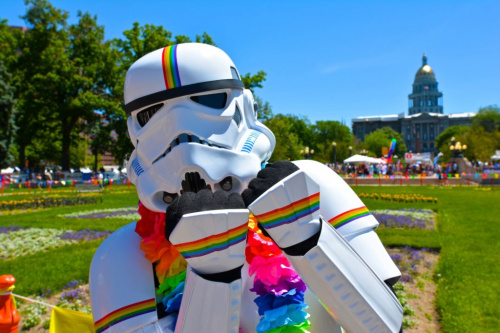
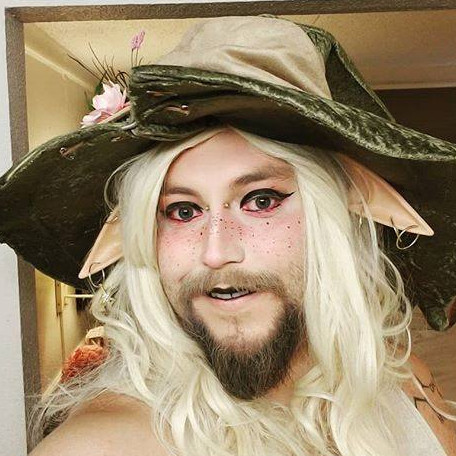
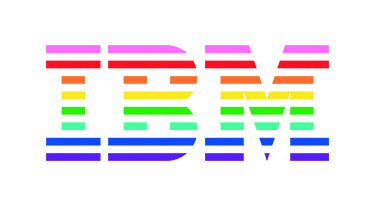



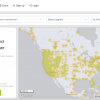

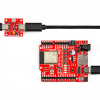
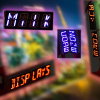
Quote: So hang in there, Nick. Tell your story, and be proud. Don’t let anyone tell you that you’re being disingenuous or exploitative. Be yourself. For every hater you see in the comments on your blog post, there’s 10 who loved it, and probably 100 who didn’t really think anything of it more than, “Oh, gee, okay, that’s cool.”
That pretty much sums it up. "Be yourself". Once again, Nick, a great article on being human.
Up front disclaimer: Yes, I am an Earthling.
C.S. and Gaston - thank you for your stories! I was raised in the eighties and only had a glimmer of what was going on with AIDS and the gay rights movement. It's incredible to think what that must have been like at IBM. Us folks, now in our mid careers have a lot to be thankful for and to remember. Thank you both for helping nudge society in a better direction.
And Nick - you've done it again! Exemplary writing. You made my hair stand up, such a great post. I and other straight-but-not-narrow folks learn so much from you. Thank you.
As someone who is on the outside looking in, I don't really get the whole LGBT labeling thing. We are all human beings, all wired a little different, and have different goals in life but why the labels? Does it really help your cause?
As far as the article goes, I am sure that it rings true with several in the electronics community. When are we going to see an article about responsible gun ownership? Seriously, I would even contribute, and be willing to take the Sparkfun staff to the range to see what it is all about.
Labels are a double edged sword. While they can certainly serve to drive people apart, they can also do a lot to bring folks together. They allow people to describe a lot of things about themselves in a very short amount of time.
For example, rather than saying "I really like math...and physics...and videogames...and puzzles...and building things...and sci fi....and...." (you get the picture), you can just say "I'm an engineer!" While it's true that not all engineers like those things, there are enough that do that it forms an archetype/stereotype that you can use to describe yourself.
This allows people to come together over common goals pretty easily. For example, if you wanted to get a bunch of like-minded people together to refurbish an old comicbook shop, you could simply put out a posting of "CALLING ALL COMIC-BOOK NERDS!" and folks who care about comics and comic culture would come running.
When it comes to the LGBT community, while there are certainly is a lot of diversity between people and their likes and dislikes. What brings us all together is the want to be treated well, to be able to marry the one we love, and to coexist without disdain amongst those around us. While that is becoming more and more true every day in some parts of the world, we are still far from anything like that in the rest.
I appreciate you commenting, despite being on the "outside," as you put it.
Re: LGBT Labels
I'm not sure I understand what you mean by "LGBT labeling thing," but if your concern is about people apparently being divided into "LGBT" and "non-LGBT" groups, I think I know where you're coming from. It's important to remember that we're only separating people into these groups in the context of a specific conversation about civil rights, in much the same way you might label people as "drivers" and "pedestrians" in the context of a conversation about, say, traffic.
Many groups throughout history have found that if they don't label themselves, they'll be labeled by other people. While you may not mind if your coworker or hackerspace partner happens to be queer (regardless of labels) my Twitter feed is constantly filled with stories of people in our industry who are excluded, ignored or harassed by otherwise professional folks because of this trait that they're told is "unrelated" to their profession. You and I may agree that it doesn't matter whether a man is a "gay engineer" or "straight engineer," (they even sound like silly distinctions) but both outright bigots and people unaware of their implicit biases make these labels matter when they keep "gay engineers" from doing their jobs all the time. And even when they're not strictly preventing them from working, they're making the workplace difficult (see Gaston's story about sharing his wedding photos and being asked if it was "a political thing")
I guess, in short, labels do help our cause for the same reason they help any cause. It turns a ragtag group of people with similar interests into a demographic, and it provides an "in-group" for people who are often expelled from other groups. Labels are a natural extension of people's urge to identify with a larger group, and while this instinct can be used to disastrous effect, I think the "LGBTQIA++ Community," such as it is, has had a net positive impact on the lives of both queer and straight people.
Re: Responsible Gun Ownership
As for gun ownership, I think I understand why you brought it up, but it's... a departure.
That said, while opinions on gun laws and ownership vary here at SFE (like anywhere) I think you'll find a hefty handful of proud responsible gun owners here at SparkFun. We're lucky to be jam packed with public shooting ranges here in Colorado and it's not unusual for a few 'funions to go out plinking together every now and then. I don't personally own a firearm (shooting is expensive!), but I've been trained in firearm safety and, well, I grew up in the Blue Ridge so I did plenty of shooting growing up.
These are very different issues
If we find a cool firearms related project, like a DIY chrono or a fancy biometric safety, I think I'm right in saying that we won't shy away from sharing it. That said, SparkFun will likely never have an official "position" on guns or gun ownership. It simply has nothing to do with us, even though there are several gun owners in the building. In contrast, LGBT rights affect several of us directly in our jobs and in the maker community, and it therefore it affects our industry, if abstractly. I want to be clear that our support of LGBT rights is not a political posture that SparkFun is taking, it's a direct response to what we perceive as a practical, ethical problem. While I personally have a lot of warm fuzzy "lefty" feelings about gay rights, SparkFun (being a corporation, not a person) can only be concerned about whether we're getting the most talented and fun to work with people in the field and whether they'll be allowed to do their jobs effectively both inside and outside our walls and as long as any kind of bigotry continues to threaten personal liberty, that isn't happening. Pride month just happens to be a good excuse to call out this particular kind of bigotry.
Thanks again for your comment, sorry for the long read.
Thank you, Nick, for this post! I am a straight guy, but have many LGBTQ friends, and have had many LGBTQ coworkers over the decades, as well as many more friends with LGBTQ relatives. I find it disgusting that we have a Vice President who's (allegedly) straight who is so so openly anti-gay. (A Shakespear quote comes to mind.). There, by being myself, I have injected some politics into it.
Thanks, Nick, for bringing us together here. I'm an out gay professional maker. It's made easier by being in design, and even more by working in San Francisco. I think those of us in the LGBTQ community and those of us who are makers hear similar things: "That'll never work." "That's against the laws of nature." And, "You're making too much noise!" Or more often, "Your outfit is blinding me."